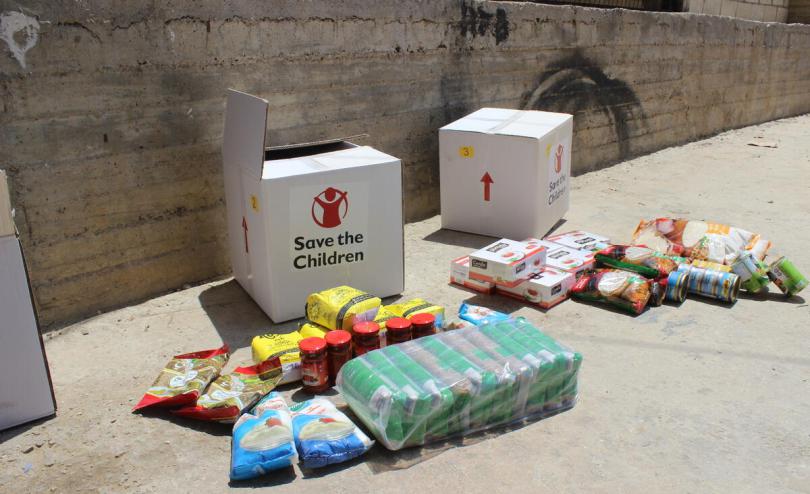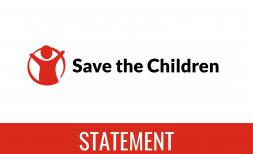Lebanon: Bread shortages fuelling tensions with Syrian refugees

Food parcels ready for distribution to vulnerable families in Lebanon (2020). Photo credit: Baraa Shkeir/Save the Children
BEIRUT, 8 August 2022 – Syrian refugees living in Lebanon are facing an increase of violence, harassment and discrimination as tensions rise over a bread shortage caused by the war in Ukraine, currency devaluation and damage at Beirut’s main grain silos, Save the Children said.
As wheat supplies run low throughout Lebanon, families are queuing for hours at a time for bread – a ripple effect of the war in Ukraine which disrupted Lebanon's main grain supply and a devastating explosion at the port two years ago. The shortage and soaring prices have sparked panic, leading to harassment and discrimination against Syrian refugees at bakeries.
“When we go to the bakery, we have to wait in line for hours and we don’t know if we will get a bag of bread. My husband was beaten out of the line because he is Syrian,” said Wafaa*, 25, who is living in refugee camp in the southern suburbs of Beirut.
According to the UN, some parts of Lebanon have issued curfews for refugee populations or asked bakeries to prioritise Lebanese citizens over Syrians by asking customers for identification. Lebanese authorities recently announced that a new security committee will be formed to help prevent fights and discriminatory acts at bakeries.
Lebanon remains the country hosting the largest number of refugees per capita with 1.5 million Syrian refugees living the country of 6.8 million people.
Due to falling wheat supplies, the price of bread has been skyrocketing, with a bag of bread costing upwards of 20,000 Lebanese Pounds (US$0.66*) in supermarkets - over four times as much as last year.
Many families are spending nearly 50% of their monthly wage on a bread. Lebanon's poorest families, who used to rely on at least two bags of bread a day as a substitute for more expensive, nutritious food, are resorting to increasingly desperate measures such as skipping meals or eating rotten food.
“I have to feed my three children mouldy bread because we are not finding fresh bread,” said Leila*, 26, a Syrian refugee living in Beirut. “Buying bread is no longer a priority for our family.”
The Lebanese Central Bank subsidises wheat imports to keep the cost of bread at bay but prices have surged as the nation’s currency has lost more than 90% of its value over the past two years amid one of the world’s worst financial crises in modern history. More than three-quarters of the Lebanese population are now living below the poverty line.
The war in Ukraine has also exacerbated wheat prices, forcing bakeries to ration subsidised bread and hoard flour which is taking a toll on all populations across the country.
Nour*, 30, is Lebanese mother of four living in Akkar in northern Lebanon. She explained her children no longer have access to fresh bread and are frequently forced to go to bed hungry.
“Some days, when my husband doesn’t have work, my four children only manage to eat one meal a day. Bread is becoming out of reach for us. My family needs a bag of bread everyday which we can’t afford anymore,” said Nour.
Jennifer Moorehead, Save the Children’s Country Director in Lebanon, said:
“Bread is not a luxury. It is a basic necessity in Lebanon, like clean water or shelter. Families rely on bread so much here that we fear hunger levels will spiral out of control and the impact will be catastrophic if this crisis continues.
“All families are feeling the impact of Lebanon’s bread shortage but refugees are facing the heaviest burden now with cases of harassment escalating. All vulnerable populations must have equal access to life-saving food, no matter their nationality.”
Just ahead of the two-year anniversary of the port explosion, a section of Beirut's large grain silos, damaged in the 2020 blast, collapsed after fermented grain sparked a fire. Prior to the 2020 port explosion, the silos had the capacity to store more than 100,000 tonnes of grain.
The port was once a lifeline for crisis-hit Lebanon, which is heavily dependent on wheat imports as domestic production only covers about 10% of the country's total consumption. The port handled about 60% of Lebanon’s imports, making procuring wheat and other basic commodities extremely difficult after the devastating explosion two years ago. If Lebanon secures international funding, the country hopes to build two new grain silos to address the worsening food crisis.
“We’re hungry, we’re scared and we’re not sure how to protect our children from this reality anymore,” said Samir*, 43, a Syrian refugee who lives in Beirut with his wife and five children. “Every two to three days we pay 20,000 to 25,000 LBP (US$0.66-$0.82) for one bag of bread. A bag that barely sustains us for a day.”
Save the Children calls on the Lebanese government and relevant stakeholders to urgently take measures to stabilize the economy to prevent further suffering of children and their families. The aid organisation is also calling on the government to reconsider lifting subsidies on bread and increase the value of cash assistance to ensure that families most impacted by bread shortages do not suffer.
ENDS
Notes to Editors:
- *The black market value of the Lebanese pound has fallen to 30,000 against the US dollar. The exchange rate is unofficial, but is the one primarily used across Lebanon.
- On average, a family of five to six members need a bag of bread (5-8 loafs of bread) every other day. The average bag of bread (weighing about 720 grams) ranges around 20,000 LBP (US$0.66). If a family needs to buy four bags of bread per week, this equals to about 80,000 LBP (US$2.60) per week (4*20,000 LBP), which is 320,000 LBP (US$10.66) per month, nearly 48% of the monthly minimum wage (which is estimated to be 675,000 LBP – US$22.50).
- A bag of flatbread (weighing 900 grams) cost 5,000 Lebanese Pounds in supermarkets in 2021: LEBANON: Months' worth of bread costs 44% of minimum wage, as families cut back on basic food | Save the Children International
*******************************************************************************************************************
For further enquiries please contact:
- Sam Halyk Samantha.halyk@savethechildren.org / +44-74235-19077 (based in London)
We have Lebanon’s Country Director available as a spokesperson.
Our media out of hours (BST) contact is media@savethechildren.org.uk / +44(0)7831 650409
Please also check our Twitter account @Save_GlobalNews for news alerts, quotes, statements and location Vlogs.




